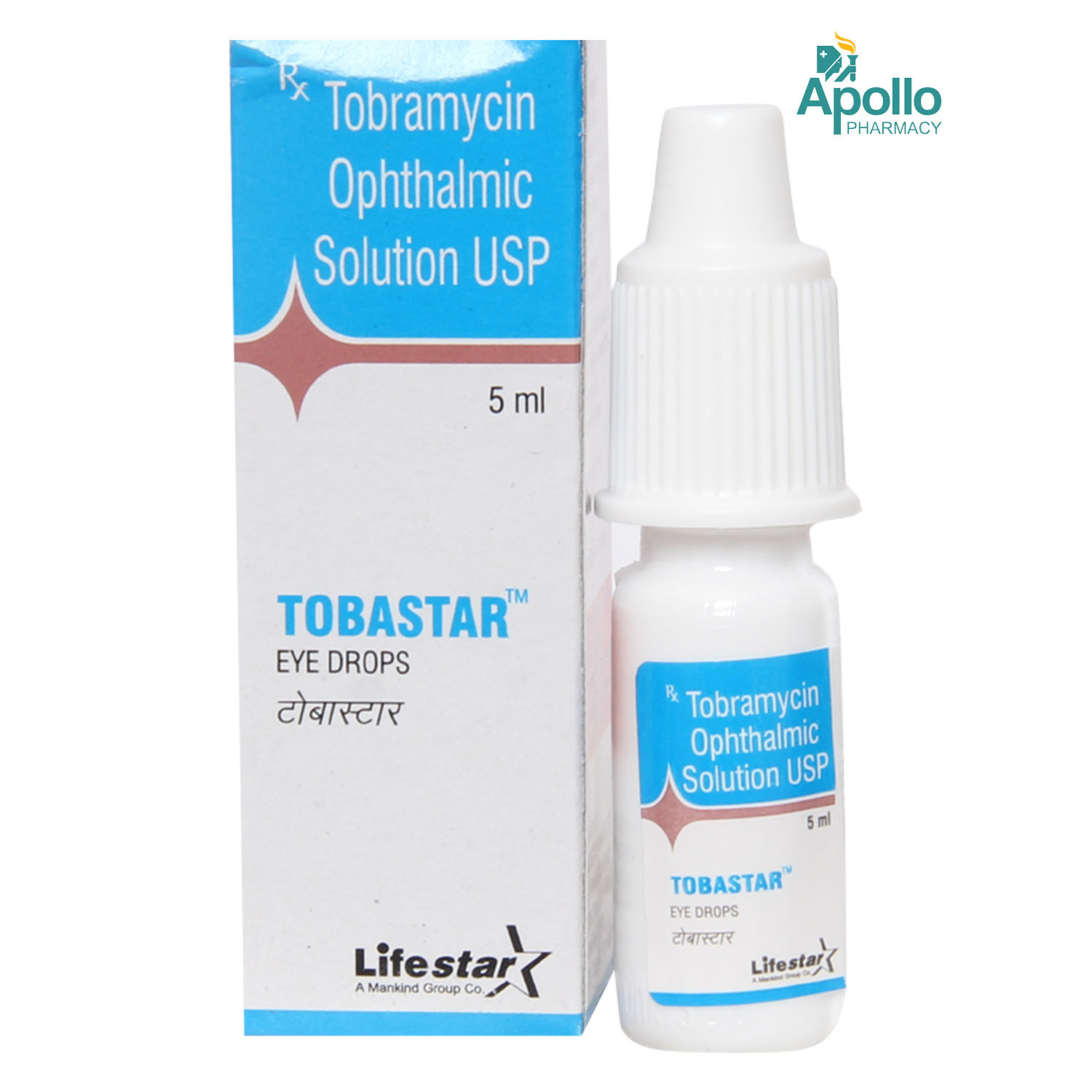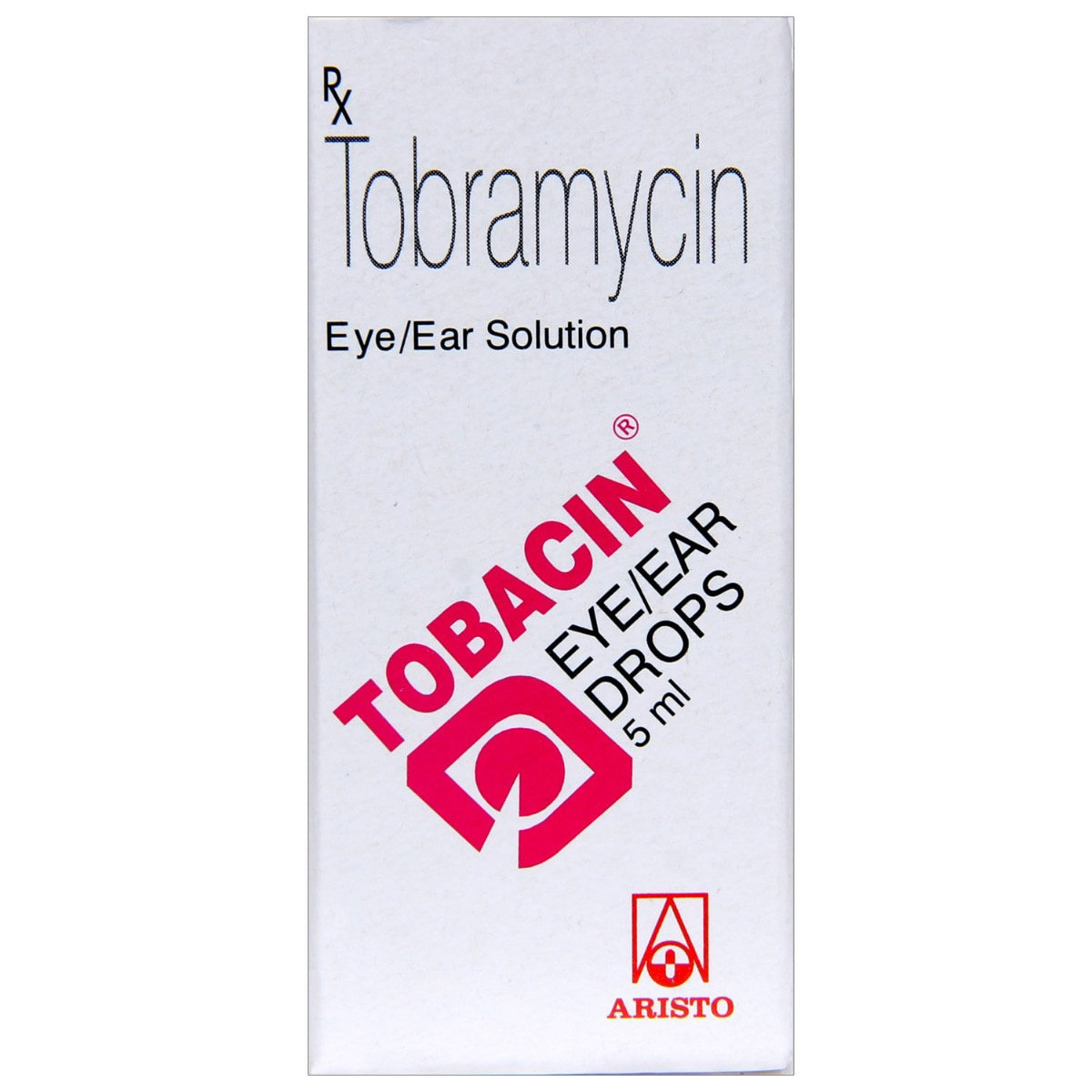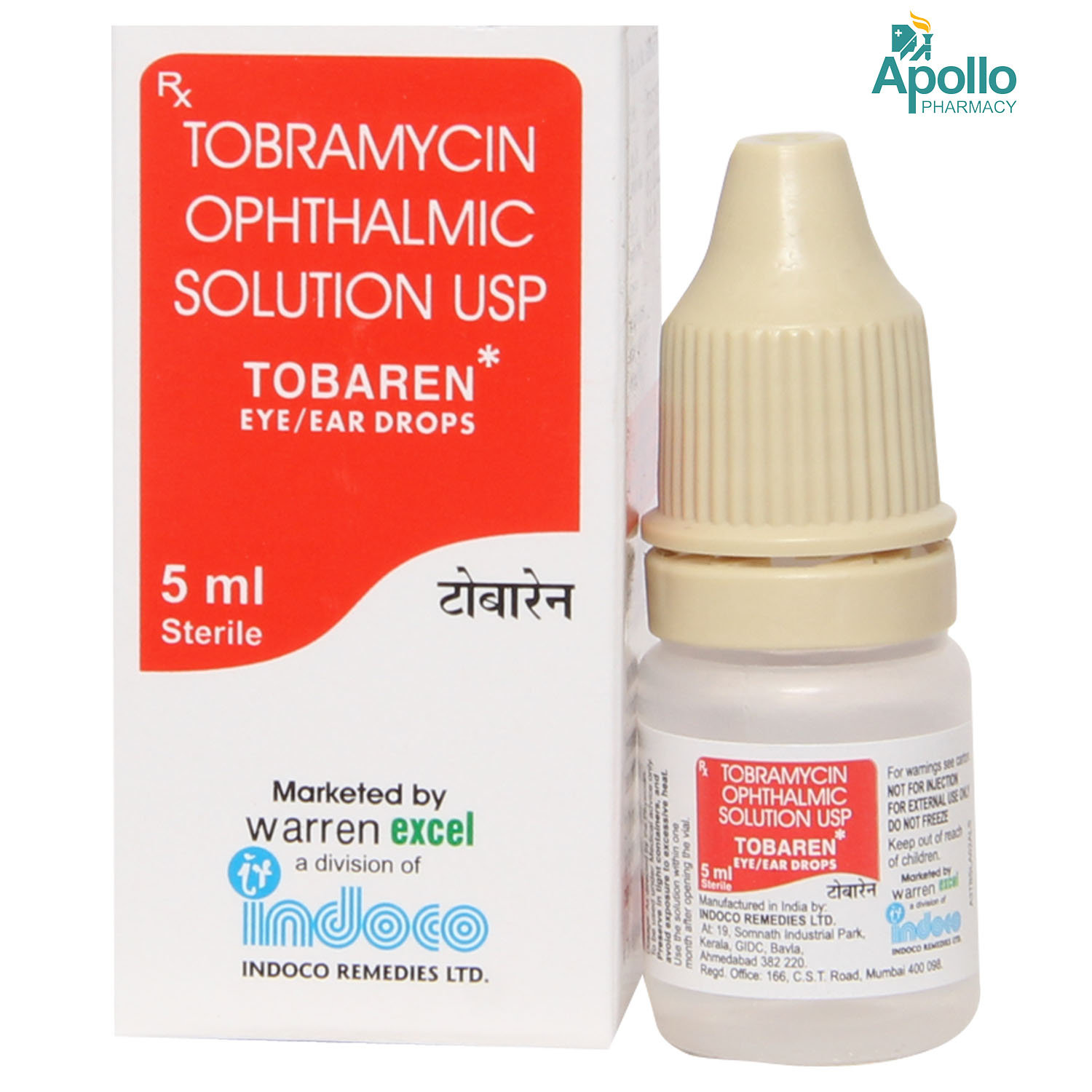Optob 0.3% Eye/Ear Drops 10 ml
MRP ₹53
(Inclusive of all Taxes)
₹8.0 Cashback (15%)
Provide Delivery Location
Online payment accepted
 Prescription drug
Prescription drugWhats That
Composition :
Manufacturer/Marketer :
Consume Type :
Expires on or after :
Return Policy :
About Optob 0.3% Eye/Ear Drops
Optob 0.3% Eye/Ear Drops belongs to the class of aminoglycoside antibiotics. It is used to treat bacterial eye and ear infections. Bacterial eye infection occurs when pathogenic bacteria enter any eye portion, including the eyeball, conjunctiva, and cornea. An ear infection occurs when bacteria invade the middle or outer ear, causing pain and inflammation.
Optob 0.3% Eye/Ear Drops contains tobramycin, which works by killing the infection-causing bacteria. Thus, Optob 0.3% Eye/Ear Drops treats bacterial eye/ear infections.
Use the Optob 0.3% Eye/Ear Drops as prescribed by your doctor. Sometimes, you may experience certain common side effects, such as discomfort, irritation, and stinging sensation. Most of these side effects do not require medical attention and resolve gradually over time. However, you are advised to talk to your doctor if you experience these side effects persistently.s
Do not use Optob 0.3% Eye/Ear Drops if you are allergic to any of its components or other aminoglycoside antibiotics (neomycin, paromomycin, kanamycin). Talk to your doctor if your condition did not improve even after using Optob 0.3% Eye/Ear Drops for a week or if it worsens. Do not use the Optob 0.3% Eye/Ear Drops without consulting your doctor if you are pregnant or breastfeeding. Please do not touch the tip of the dropper to the eye/ear or surrounding areas, as it may contaminate the contents. Optob 0.3% Eye/Ear Drops should be used in children only if prescribed by the doctor.
Uses of Optob 0.3% Eye/Ear Drops
Directions for Use
Key Benefits
Optob 0.3% Eye/Ear Drops contains tobramycin, an aminoglycoside antibiotic that kills the infection-causing bacteria. Thereby it effectively treats various bacterial eye/ear infections.
Drug Warnings
Do not use Optob 0.3% Eye/Ear Drops if you are allergic to any of the components present in Optob 0.3% Eye/Ear Drops. Before using Optob 0.3% Eye/Ear Drops, inform your doctor if you have vision problems, severe eye pain, glaucoma (high blood pressure), eye injury, eye or ear surgery, hearing problems (cytotoxicity), or a perforated eardrum and chronic otitis media. Notify the doctor if you are pregnant, planning to become pregnant, or are breastfeeding. Contact your doctor if the infection symptoms persist or worsen after two weeks of treatment. Before taking the Optob 0.3% Eye/Ear Drops, notify your doctor about your medical history and other medications you are now taking to rule out any potential adverse effects or interactions.
Drug-Drug Interactions
Drug-Drug Interactions
Login/Sign Up
Coadministration of cidofovir with Optob 0.3% Eye/Ear Drops 10 ml can cause kidney problems.
How to manage the interaction:
Taking Optob 0.3% Eye/Ear Drops 10 ml with Cidofovir is not recommended, but can be taken if prescribed by a doctor. However, if you experience nausea, vomiting, loss of appetite, increased or decreased urination, sudden weight gain or weight loss, swelling, shortness of breath, bone pain, muscle cramps, tiredness, weakness, dizziness, confusion, and irregular heart rhythm contact your doctor immediately. Do not stop using any medications without consulting a doctor.
Co-administration of Optob 0.3% Eye/Ear Drops 10 ml with torasemide increases the risk of toxicity.
How to manage the interaction:
Although taking Optob 0.3% Eye/Ear Drops 10 ml and torasemide together can possibly result in an interaction, it can be taken if your doctor has advised it. However, if you experience symptoms such as blurred vision, dry mouth, dry skin, frequent urination, nausea, and stomach pain, consult a doctor immediately. Do not discontinue any medications without consulting a doctor.
Coadministration of Optob 0.3% Eye/Ear Drops 10 ml with Sirolimus can cause an increased risk or severity of kidney problems.
How to manage the interaction:
Although taking Sirolimus and Optob 0.3% Eye/Ear Drops 10 ml together can evidently cause an interaction, it can be taken if a doctor has suggested it. However, if you experience nausea, vomiting, a decrease in hunger, increased or decreased urine, weight gain or loss that occurs suddenly, fluid retention, swelling, difficulty breathing, muscle pain, fatigue, weakness, dizziness, confusion, and irregular heartbeat, consult a doctor. Do not discontinue any medications without a doctor's advice.
Taking magnesium sulfate with Optob 0.3% Eye/Ear Drops 10 ml can increase the risk of muscle weakness.
How to manage the interaction:
Although taking Magnesium sulfate and Optob 0.3% Eye/Ear Drops 10 ml together can evidently cause an interaction, it can be taken if your doctor has suggested it. However, if you experience symptoms such as muscle weakness and breathing difficulties consult your doctor immediately. Do not stop using any medications without a doctor's advice.
Using Atracurium with Optob 0.3% Eye/Ear Drops 10 ml can increase the risk of respiratory depression (breathing disorder).
How to manage the interaction:
Although there is a interaction between Optob 0.3% Eye/Ear Drops 10 ml and Atracurium, but it can be taken if prescribed by a doctor. Do not stop using any medications without talking to your doctor.
Taking deferasirox with Optob 0.3% Eye/Ear Drops 10 ml may increase the risk of kidney problems.
How to manage the interaction:
Taking Optob 0.3% Eye/Ear Drops 10 ml with Deferasirox together can possibly result in an interaction, but it can be taken if your doctor has advised it. However, if you experience nausea, vomiting, loss of appetite, increased or decreased urination, sudden weight gain or weight loss, swelling, shortness of breath, bone pain, muscle cramps, tiredness, weakness, dizziness, confusion, and irregular heart rhythm contact your doctor immediately. Do not stop using any medications without talking to your doctor.
Using Botulinum toxin and Optob 0.3% Eye/Ear Drops 10 ml together may increase the risk of side effects.
How to manage the interaction:
Although taking Botulinum toxin and Optob 0.3% Eye/Ear Drops 10 ml can cause an interaction, it can be taken if prescribed by a doctor. However, contact a doctor immediately if you experience excessive muscle weakness or trouble breathing, swallowing, or speaking. Do not discontinue any medications without consulting a doctor.
Using Vecuronium with Optob 0.3% Eye/Ear Drops 10 ml can increase the risk of respiratory depression(hypoventilation).
How to manage the interaction:
Co-administration of Optob 0.3% Eye/Ear Drops 10 ml with Vecuronium can possibly result in an interaction, but it can be taken if your doctor has advised it. However, if you experience any unusual symptoms contact your doctor immediately. Do not discontinue any medications without consulting your doctor.
Using Optob 0.3% Eye/Ear Drops 10 ml together with everolimus can increase the risk of kidney problems.
How to manage the interaction:
Although there is a possible interaction between Everolimus and Optob 0.3% Eye/Ear Drops 10 ml, you can take these medicines together if prescribed by a doctor. However, if you experience sudden weight gain, feeling out of breath, or having kidney problems. If you experience nausea, vomiting, loss of appetite, weight loss, swelling, muscle cramps, weakness, dizziness, confusion, or an irregular heartbeat contact a doctor immediately. Do not stop using any medications without a doctor's advice.
Takin human immunoglobulin with Optob 0.3% Eye/Ear Drops 10 ml may raise the risk of kidney problems.
How to manage the interaction:
Although taking Human immunoglobulin and Optob 0.3% Eye/Ear Drops 10 ml together can cause an interaction, it can be taken if a doctor has suggested it. However, if you experience nausea, vomiting, loss of appetite, increased or decreased urination, sudden weight gain or loss, swelling, shortness of breath, muscle cramps, tiredness, weakness, dizziness, confusion, or an irregular heart rhythm, consult a doctor. Do not discontinue any medications without consulting a doctor.
Drug-Food Interactions
Drug-Food Interactions
Login/Sign Up
Diet & Lifestyle Advise
Eye infections:
- Get at least six to eight hours of sleep each night to renew your eyes.
- It would help to wash your eyes with clean water at least twice or thrice daily. If you have had eye surgery, wait at least two weeks before washing your eyes.
- Take care of your health, eat a balanced diet, exercise regularly, and rest well.
- Regularly wash your hands. Keep unclean hands away from your eyes.
- Do not rub your eyes.
- Eyeliner, mascara, and kohl should not be shared.
- Wipe your eyes and face with clean towels or tissues at all times.
- Suppose you wear contact lenses; clean and replace them more frequently. Never share your contact lenses. Always wash your hands before and after inserting and removing contact lenses.
- Avoid gazing at digital screens for extended periods.
- Blink frequently to aid in the spread of hydrating substances like mucus and tears across the eyes.
Ear infections:
- Immunity aids in the prevention of infection. To strengthen your immune system, include fruits and vegetables, high-quality proteins, and whole wheat grains in your diet.
- Avoid consuming foods you are allergic to, as they can cause the body to produce excessive mucus, resulting in inflammation.
- Avoid getting shampoo, soap, and water in the ear because they can cause itching.
- Poking or scratching the ear can cause damage to the ear canal, resulting in inflammation.
- Quit or limit the intake of caffeine and alcohol.
Side Effects of Optob 0.3% Eye/Ear Drops
- Application site discomfort
- Application site irritation
- Stinging sensation
Habit Forming
Therapeutic Class
All Substitutes & Brand Comparisons
RX
Out of StockRT-Mycin Eye/Ear Drops
₹53
(₹9.54/ 1ml)
100% COSTLIERRX
Out of StockTobrative Eye/Ear Drops
₹60
(₹10.8/ 1ml)
126% COSTLIERRX
Out of StockVetob Eye/Ear Drop 5 ml
Vee Remedies
₹65
(₹11.7/ 1ml)
145% COSTLIER
Author Details
We provide you with authentic, trustworthy and relevant information
Drug-Diseases Interactions
Drug-Diseases Interactions
Login/Sign Up
FAQs
Special Advise
- Do not touch the tip of the dropper/tube as it may contaminate the contents.
Disease/Condition Glossary
Bacterial eye infections: Bacterial eye infection occurs when harmful bacteria invade any part of the eye, such as the eyeball, conjunctiva, or cornea. Symptoms of an infection include red eye, pain, discharge, watery/dry eyes, swelling, itching, and sensitivity to light. The common bacterial eye infections are conjunctivitis, stye, and keratitis. Conjunctivitis (pink eye) is the infection/inflammation of the conjunctiva (white part of the eye) and the inner eyelid. A stye is a bump on the eyelid or base of eyelashes. Keratitis is the inflammation of the cornea. It is a common problem in people who wear contact lenses.
Bacterial ear infections: An ear infection occurs when the bacteria affect the middle or outer ear, leading to pain and inflammation. An ear infection occurs when the Eustachian tubes (small tubes that run from each ear to the back of the throat) become blocked or swollen. Ear infections can be painful due to inflammation and fluid build-up. Symptoms include pain or discomfort inside the ear, pus or fluid-like drainage from the ear, feeling of pressure inside the ear, and loss of hearing.

Have a query?
Alcohol
Safe if prescribed
It is not known if alcohol affects Optob 0.3% Eye/Ear Drops. However, it is advisable to limit or avoid alcohol as a precautionary measure.
Pregnancy
Consult your doctor
There are no adequate and well-controlled studies on pregnant women. Please consult your doctor. Your doctor will prescribe only if the benefits outweigh the risks.
Breast Feeding
Consult your doctor
Consult your doctor as there is no substantial research yet on the use of Optob 0.3% Eye/Ear Drops in breastfeeding/nursing mothers.
Driving
Safe if prescribed
Optob 0.3% Eye/Ear Drops may cause blurred vision temporarily after using the drops in the eye. Before driving or operating any machinery, wait until your vision is clear.
Liver
Consult your doctor
Limited information about the usage of Optob 0.3% Eye/Ear Drops in patients with liver disease is available. Please consult your physician. Your doctor will weigh the benefits and potential risks before prescribing Optob 0.3% Eye/Ear Drops.
Kidney
Consult your doctor
Limited information about the usage of Optob 0.3% Eye/Ear Drops in patients with kidney disease is available. Please consult your physician. Your doctor will weigh the benefits and potential risks before prescribing Optob 0.3% Eye/Ear Drops.
Children
Safe if prescribed
Optob 0.3% Eye/Ear Drops should be used in children only if prescribed by the doctor.










